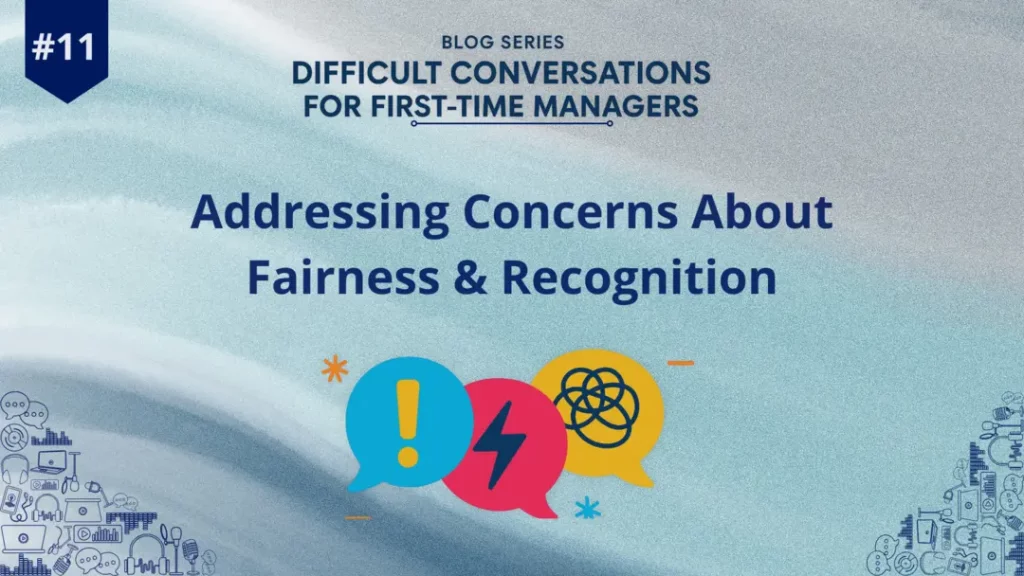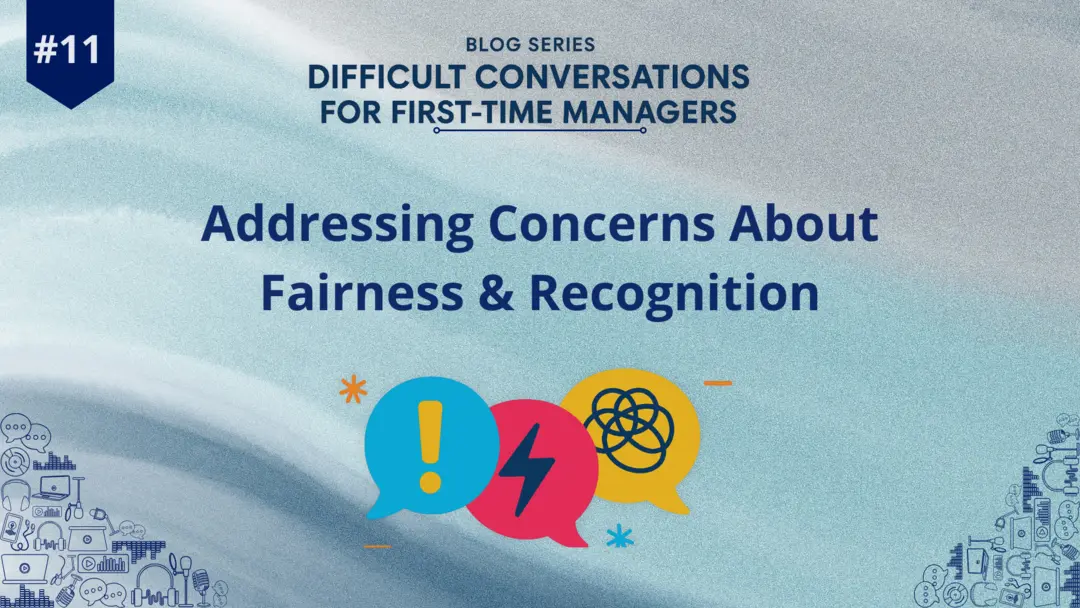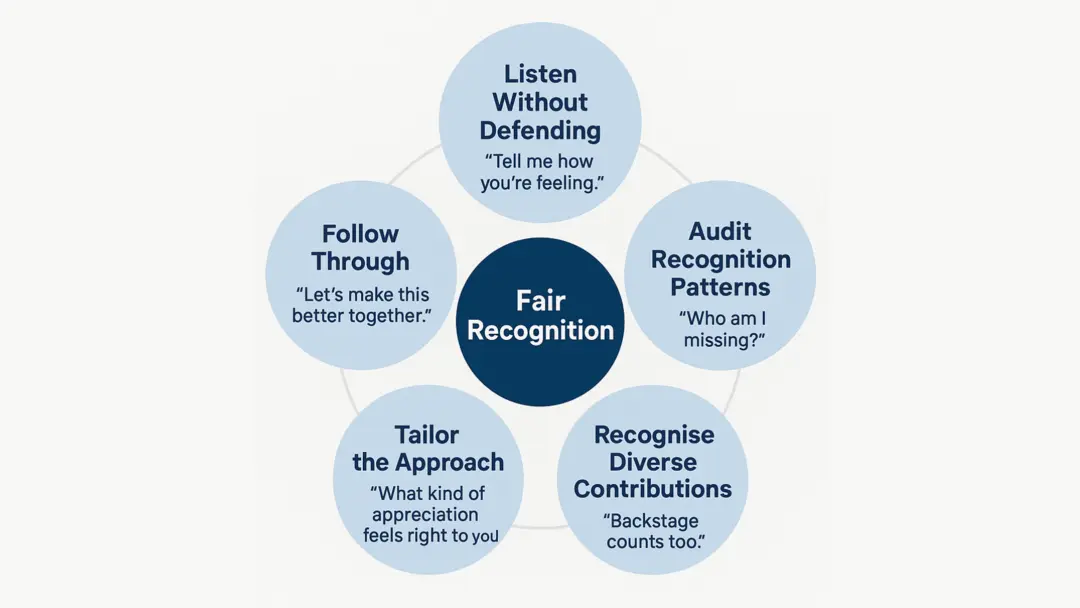“Are you playing favourites?”


That’s one of the most unsettling questions any manager can be asked. Especially if you’re new to the role, trying your best, and genuinely feel you’re being fair. But if even one team member feels otherwise, the damage is done—to trust, morale, and your own confidence.
So here’s a question to ponder: As a first-time manager, how do you recognise contributions fairly without letting unconscious bias or perception gaps affect your team’s motivation?
Welcome to one of the trickier leadership terrains: Addressing concerns about fairness and recognition.
The Recognition Dilemma in Indian Workplaces
In many Indian teams, especially where hierarchy and respect for authority are deeply ingrained, employees might hesitate to speak up when they feel overlooked. But silence doesn’t mean satisfaction. It just means simmering disengagement.
Picture this: You’ve just wrapped up a team townhall. You called out the rockstars who nailed a recent pitch—loud, enthusiastic, always speaking up. The next day, a quiet but consistent performer from the backend walks into your cabin and says, “I don’t think our work ever gets recognised.”
Your stomach drops.
Now you’re in the middle of a difficult conversation—one that’s not about performance, but about perception.
Why This Conversation Is So Difficult for First-Time Managers
Let’s be honest—most new managers aren’t trained to deal with emotional undercurrents. We’re taught to reward results. But what we often overlook is that recognition isn’t just about merit; it’s also about meaning.
Employees aren’t just saying “you missed my name”—they’re saying “you don’t see me.”
Here’s what makes this conversation tricky:
- You might not be aware of your own bias.
- Recognition often feels subjective, even when you try to be objective.
- It’s hard not to get defensive when your intentions are questioned.
But here’s the opportunity: The way you handle this conversation can either deepen trust or damage it.
From Conflict to Connection: Leadership Actions That Matter
Let’s explore a few actionable strategies—grounded in real Indian workplace dynamics—that help you navigate this delicate space.
1. Acknowledge the Discomfort Without Avoiding the Discussion
Avoiding the conversation is easy. But it only leads to further disengagement. When an employee raises concerns, start by listening without defending.
Say:
“Thank you for telling me this—it’s not easy to bring up. Let’s talk through it.”
Real-life tip: In Indian settings, where employees often “hint” at concerns instead of stating them directly, watch for subtle cues—like someone withdrawing from discussions, or saying things like, “My work is behind-the-scenes, so no one notices.”
2. Audit Your Recognition Patterns
We all have biases. Maybe you’re giving more praise to the most vocal team members. Or those whose work is visible. Or those you personally relate to.
Use a simple spreadsheet. Track who you’ve recognised in the past 2–3 months and for what.
Ask yourself:
- Are remote or hybrid employees being left out?
- Are support roles being acknowledged?
- Are introverts being appreciated in meaningful ways?
Leadership means shining the spotlight, not just on the stage—but backstage too.
3. Redefine Recognition Beyond Results
In Indian organisations, sales and client-facing roles often get the lion’s share of attention. But what about:
- The analyst who caught a reporting error before it reached the client?
- The HR exec who quietly resolved a morale issue?
- The junior employee who volunteers to mentor new joiners?
Action: Introduce a recognition wall (virtual or physical) that celebrates efforts, values, and impact—not just revenue.
4. Create Inclusive Recognition Rituals
Not everyone wants public praise. Some might appreciate a thank-you note, others a quiet word in a 1:1. Cultural humility matters too—some people may feel awkward receiving praise in public.
In your 1:1s, ask:
“What kind of recognition feels meaningful to you?”
Let your leadership flex to their comfort, not just your style.
A Case in Point: When Priya Listened Before Leading
Let’s bring this home with a simple story.
Priya, a first-time manager in a Bengaluru-based tech startup, was thrilled when her project delivery team nailed a high-profile migration. She appreciated the senior engineers publicly—but later, Aarav, a soft-spoken QA analyst, told her he felt ignored.
Instead of brushing it off, Priya:
- Listened, without defending.
- Asked for feedback: “Can you tell me when you felt this happened?”
- Reflected on her recognition log—and realised QA team contributions were under-acknowledged.
- Took action—creating a broader monthly appreciation ritual that rotated across functions.
The result? A more connected team—and a manager who gained respect as someone willing to grow.
“The deepest craving of human nature is the craving to be appreciated.” — William James
Recognition isn’t about grand gestures—it’s about making people feel seen.

Thought to Leave You With
As a first-time manager, your intent may be good. But perception shapes reality.
The real mark of leadership isn’t how well you lead when things are going smoothly—it’s how courageously you lead when someone tells you they feel unseen.
So the next time someone says, “I don’t feel my work is being recognised,” don’t panic. Lean in. It’s not a critique—it’s a call for connection.
Because leadership, at its heart, is not about being right. It’s about making things right.
This article is contributed by the GlobalGyan Editorial Team as part of our Leadership Essentials series. In our series ‘Difficult Conversations for First Time Managers’ by Guan D’Penha, Senior Manager – Learning Solutions at GlobalGyan Leadership Academy, we will be sharing insights on the challenges faced by first-time managers.
Up next in our ‘Difficult Conversations for First-Time Managers’ series: “It’s Not My Job to Fix Their Personal Problems”—Or Is It? — where we’ll explore how managers can support employees through personal struggles without crossing professional boundaries, and why empathy is a critical (but often overlooked) leadership skill.






Responses